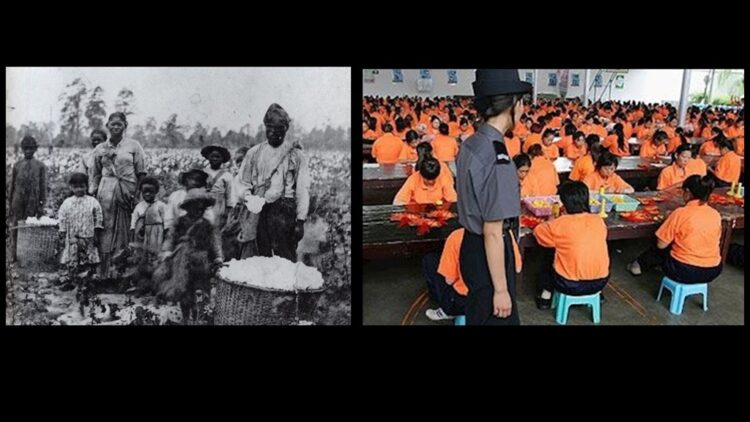Unjust Trade
I.
An endless wet: Earth’s gathered sea-salt tears
Wept-swept before a rising, darkening gale,
As dim horizon fades and disappears
Behind a slave ship’s squared tri-masted sail.
Her hold full-filled with human suffering,
With chain-torn flesh sustained by lice-laced gruel,
To serve the needs of cotton, cane and king;
A blood-sweat trade in souls both cursed and cruel.
As Trade winds, Gulf Stream, doldrums, hurricane
Compete both for-against the seaman’s hand
To tack attack the bounding wave-tossed main
On sea chart dotted lines from land to land.
While slavers and their clients profit from
The sacrifice of human life for rum.
II.
And sadly, what once was, is still today,
As women, men and children without name,
Like cattle–bought and sold the same old way–
Abused and used by traders dead to shame.
Such wretched refuse, culled from distant shores,
Vast huddled masses, yearning to breathe free;
In hopeless hope, ensnared by drug-turfed wars,
Stripped bare of both their lives and liberty.
The darkness falls, horizons disappear,
While endless sea-salt tears are wept and shed,
And cries and prayers that God alone can hear
Are uttered as if uttered by the dead.
And as before and more, the slavers sell
Their souls for sex and money, power . . . and hell.
James A. Tweedie is a retired pastor living in Long Beach, Washington. He has written and published six novels, one collection of short stories, and four collections of poetry including Sidekicks, Mostly Sonnets, and Laughing Matters, all with Dunecrest Press. His poems have been published nationally and internationally in both print and online media. He was honored with being chosen as the winner of the 2021 SCP International Poetry Competition.
















Two timely pieces, James. I’ve just returned from the Gulf (not the Gulf of Mexico, the Arabian Gulf), where often the line between slavery, bonded Labour and legitimate employment is razor thin.
Thanks for the reads.
Such a sad morose poem reflecting reality then and now. I was fascinated by your inner use of bonded words with a hyphen. Creative and unusual.
Roy, Hyphenating/juxtaposing words is something I do often to create Pseudo-compound words that (hopefully) create an effect that intensifies what the words may represent separately. In a way, it is a sort of shorthand so as to say more with less, especially where poetic form strictly limits the number of words and syllables available. Some have criticized me for overdoing this and I suppose that is a matter of taste or adherence to grammar that I prefer to stretch when it suits my needs. I’m glad you noticed and commented on it.
Very powerful, especially the last four lines of II.
Jim, these are such heartfelt and finely-crafted sonnets. I really like the idea of a “double sonnet”– this opens up myriad possibilities for greater exploration of a topic or sentiment, either by complement or by contrast! Were this an Old English poem, the word kenning would be applied to your compound words such as “wept-swept”, “cattle-bought”, and “chain-torn”… but modern uses are equally as valid and powerful. You are definitely in keeping with the history of the English language in your excellent use of kennings!! Very well done!!
Theresa,
I had not heard of “kennings” before but after doing a little research on the subject have decided that you are spot on in making a connection between Jennings and my use of hyphenated words. Old kennings such as “whale-road” for “sea” or “battle-sweat” for “blood” could easily have found their way into one of my poems. I wonder if the word, “kennings” is related to the Scots word “ken,” which means “to know?” That would make sense to me, but I’ll leave the thought as merely speculation. Thanks for the intriguing comment.
Jim, you’re so right about the work “kenning”!! I asked Chat GPT about it, and it gave me the following information:
From Old Norse “kenna” meaning “to know,” “to perceive,” or “to name.”
Related to Old English “cennan” (to make known, declare; also to beget), and “cunnian” (to know by experience or try).
Related to the word “ken” (still used in Scots and Northern English dialects), meaning “to know” or “understand.”
All of these trace back to Proto-Germanic “kannjaną” (“to make known”) and “kunnaną” (“to know”).
So your instincts about the word “kenning” were spot on! I love how Indo-European languages have these interesting connections in their related words!!!
Now I know how the ocean was created. May I never set foot in it again. Sometimes it seems that we haven’t come as far as we thought we had.